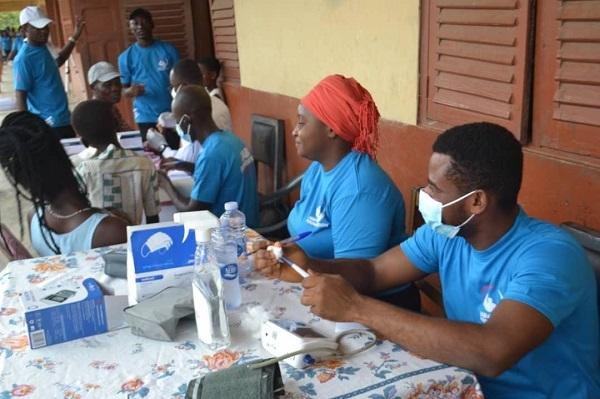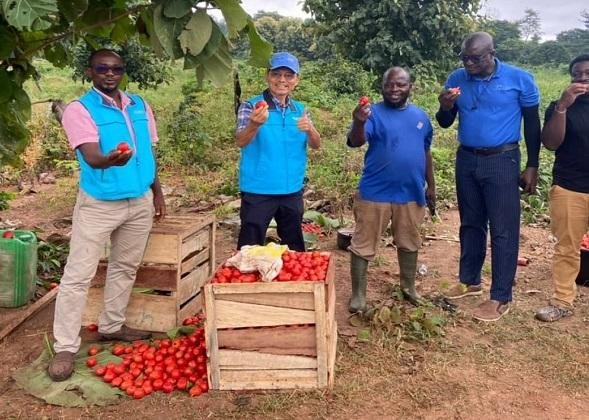News
Pay attention to health of prisoners’

Some members of the public being screened
The government has been urged to pay more attention to the health of prisoners as the absence of that could pose public health risk in the society.
Founder of Jabi Foundation, a non-governmental organisation, Ms Mary Yaa Wujiti, cautioned; “If we neglect the prisoners, remember the officers manning there will pick up infections and bring it to their dependents and the general community; the churches, mosques, market, school which is why we must prioritise their health.”
She shared the advice in an interview with The Spectator when her organisation in collaboration with LAMACONSULT, a conflict resolution focused NGO, organised a free health screening for inmates and officers of the Ankaful Maximum Prison in the Central region.
In all, about 400 individuals were screened for conditions including blood pressure, sugar, malaria, ear, nose, and throat (ENT) as well as eye complications with essential medications, eye glasses and assorted food items also donated to the facility.
Ms Wujiti said that one of the key values of Jabi Foundation was empathy which was its major drive to reach out to inmates and bring healthcare to their doorsteps.
“Since prisons is one neglected area in our society, we thought of bringing healthcare to their doorstep to put a smile on their face.”
Ms Wujiti, also an Ophthalmic Nurse, observed that due to overcrowding in the cells, most of the inmates had skin infections, some of which were communicable with others, particularly elderly inmates suffering blurred vision.
“Others complained of body aches, had nutritional deficits, among others so we appeal to the government, NGOs and the general public to support the healthcare systems in the prisons by providing them with medications, consumables and other necessary equipment to promote their wellbeing.”
She further encouraged members of the public to undertake an eye test at least once a year because, “blinding eye conditions are very silent, they don’t come with pain but before you realise you are blind.”
By Abigail Annoh
News
No ban on Odwira Festival – Okuapeman spokesperson

The spokesperson for Okuapehene, Ohenenana B.S. Opoku, has dismissed social media reports that there is insecurity in Okuapemam and for that matter an indefinite ban has been placed on the celebration of this year’s annual Odwira Festival.
Ohenenana Opoku, who is also a member of the Odwira Festival Planning Committee, said Odwira would be celebrated and all the necessary arrangements have been made for a peaceful celebration.
According to him, there is no merit in all the allegations on the media space because there has not been any chieftaincy dispute in any of the divisional heads in the area.
“There is absolute peace in Okuapeman, therefore, all Okuapeman citizens living in Ghana and abroad should come home to celebrate the Odwira Festival.”
In a press briefing at the Okuapeman Palace in Akropong on Friday, Ohenenana Opoku described the allegations as false, stating that all the divisional chiefs have been gazetted and recognised in Ghana’s Chieftaincy records.
He said Okuapemam has been celebrating Odwira Festival for the past five years under the leadership of Oseadeeyo Kwasi Akuffo III without any dispute.
He emphasised that Okuapeman constitutes 17 major towns with their own chiefs under Okuapemanhene and that nobody has the right to ban or stop any chief from celebrating it.
Ohenenana Opoku appealed to the people of Ghana to come and enjoy the Akuapem Odwira Festival which is one of the best cultures in Ghana.
In view of that, the Yagbonwura, Bii-Kunuto Jewu Saole, has accepted to grace the festival as the special guest of honour.
By Linda Abrefi Wadie
Join our WhatsApp Channel now!
https://whatsapp.com/channel/0029VbBElzjInlqHhl1aTU27
News
Lead contamination in products can cause anaemia, brain damage — UNICEF, FDA

Childdren and pregnant women in Ghana are unknowingly being exposed to toxic levels of lead in everyday products, a new study by UNICEF and the Food and Drugs Authority (FDA) has revealed.
The nationwide study, which covered all 16 regions, found dangerous levels of lead contamination in items such as cosmetics, food, and household products, posing significant threat to public health, particularly to children and women of childbearing age.
A statement on the report copied to The Spectator in Accra on Monday explained that several commonly used items contained alarmingly high concentrations of lead.
Lead, a heavy metal used in batteries, paints, ceramics, and other industrial materials, is highly toxic even in small quantities.
Experts warn that it can cause irreversible brain damage, developmental delays, learning difficulties, and behavioural problems in children.
The study stressed that there were no safe levels of lead in the human body.
Traditional eyeliners known locally as kaji kaji or kholi, which many mothers use to brighten their children’s eyes, had contamination levels tens of thousands exceeding permissible limits.
White baked clay, called shire, ayilor, or farinkasa and commonly consumed by pregnant women to ease nausea, also tested positive for lead contamination in about 25 per cent of samples, with the highest rates recorded in the North East and Greater Accra regions.
Ground turmeric, a staple spice used across Ghana, was found to be contaminated in 42 per cent of samples, with particularly high levels in the Greater Accra (84 per cent), Central (75 per cent), and Bono (60 per cent) regions.
Similarly, locally prepared corn-based cereal (Tom Brown) showed lead contamination in 4.4 per cent of samples, mostly from the Eastern Region.
Old plumbing systems and certain cookware were also identified as possible sources of exposure, as lead can leak into drinking water or food during cooking.
The health impacts are severe. Lead exposure can cause anaemia, stunted growth, hearing loss, seizures, and pregnancy complications such as low birth weight and miscarriage.
UNICEF has, therefore, called for immediate national action to address the crisis, calling for public awareness campaigns, stricter enforcement of product safety standards, and routine screening for lead exposure, especially among vulnerable groups.
UNICEF reaffirmed its commitment to supporting the Government of Ghana and relevant partners to eliminate lead exposure and safeguard the health of every woman and child.
By Esinam Jemima Kuatsinu
Join our WhatsApp Channel now!
https://whatsapp.com/channel/0029VbBElzjInlqHhl1aTU27







